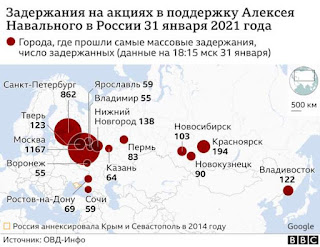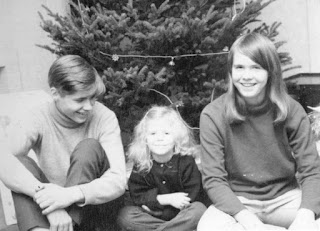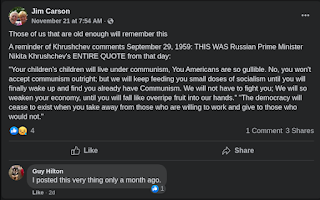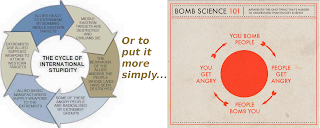If I had to reduce this year's blog themes to the most essential, here's how I'd sum them up:
A year of losses.
A year of lies.
... and as if in compensation,
A year of learning and re-learning trust.
Thank you for your company!
JANUARY:
"A country deliberately founded on a good idea" (January 7)
What is this patriotism? As a grateful immigrant, I have some views on this question, but they're certainly not original to me. Once again I turn to the journalist John Gunther, whose introduction to his book Inside U.S.A. (1946) calls the USA "a country deliberately founded on a good idea." Our founding documents make that good idea clear: we were all created equal; and our rights to life, liberty, and the pursuit of happiness are derived NOT from a ruler's indulgence or from social rank, but irrevocably granted by our Creator! Abraham Lincoln expressed in the simplest terms how such a free people are to be governed: through a "government of the people, by the people, for the people...."
Every aspect of this "good idea" has vulnerabilities, and our nation has tested them all. Do we really believe that we're all created equal, or can we cut some corners to the advantage of those we identify with most? Can we really govern ourselves, or are there some tacit standards of wealth, education, good connections, or other badges of entitlement that represent shortcuts to power? When our inevitable conflicts arise, do we have trustworthy mechanisms to discern justice, or do the loudest or most resourceful communicators prevail? Do we prioritize the fair distribution of opportunities to pursue happiness, or do we (as John Fea suggests) rely on the manipulative power of a mythical nostalgia?
FEBRUARY:
How to write about Russia, part two
 |
| Cities with significant numbers of arrests on January 31. (Update: OVD-Info's Web site has been ordered blocked in Russia.) |
Above all, I have sought to document that Russians don't need to be told by the West what is wrong with their country. There are Russians who already know! They employ anger and humor (sometimes simultaneously) and great passion, in the service of self-diagnosis. I've shared examples of this, despite my misgivings that Russians might resent having these conflicts exposed (Pushkin said "I despise my country from head to toe, but it really gets on my nerves when a foreigner shares these views"), because it testifies to an important capacity for self-correction.
How to write about Russia, part one; part three.
MARCH:
Credible faith, part one
I believed then, and still believe now, that whatever decline the church is suffering (and it certainly is!), this decline does not come from some stubborn church-wide insistence on superstition. There are very lively conversations going on among theologians and scientists, many of whom in the 21st century are drawing on insights ranging from biology to cosmology and quantum mechanics, all challenging the conventional boundaries between theology and science. Biblical scholars have equally fertile dialogues on the composition and ratification of the Scriptures, and sometimes even deign to tell the rest of us what they're talking about in language we can understand. Eastern and Western Christianity challenge each other's conceits, while both learn how to relate with the rest of the world's faiths, and with the atheists whom God loves as much as any of us.The scandal that repels and expels people from the church is not its ability to express mystery and hope, nor its claim that we can have a meaningful relationship with the Creator who desired us into existence. It is our willingness to hide all that amazing stuff in the background in favor of our cutting and one-upping each other, cruelly exiling those we don't approve of, and straining all that is holy to ingratiate ourselves with the powers that be.
Credible faith, part two.
APRIL:
Mikhail Yurievich Roshchin; Johan Fredrik Heyerdahl. Two tributes.
It's been a rough few days. On Saturday morning, I learned that Misha Roshchin, my oldest friend in Russia, had died just a few hours earlier in Moscow. Then, just yesterday, as I was planning what to say here about Misha, I was hit with the news that my dear cousin Johan Fredrik Heyerdahl had died earlier that morning, Oslo time.I'm not the right person to provide formal biographies or eulogies for either Misha or Johan Fredrik, but I can't let the week go by without saying something. So here are two tributes based on my own personal recollections of these two, and the influences they have had on my life.
Also: Vitaly Vladimirovich Adamenko 1977-2021.
MAY:
"The church is like a ..."
During our Russia years, we often found it difficult to convey what the word "church" meant to us. This was true among our students, and also among some of the attenders of our Quaker meeting. Many were generations removed from traditional parish involvements. Instead, sometimes the most obvious models were discussion groups, peer support groups, and self-help or self-improvement groups.
...
Back in the mid-1970's, Avery Dulles wrote the first version of his book Models of the Church. The "models" he describes are helpful and evocative, and together they build up a sense of the inclusivity and continuity of the Body of Christ. However, the language of these models might be a bit dense and abstract for those who have never connected with church as we understand it. My own most basic understanding of church in a Quaker context is this: a church is a group of people who gather around Jesus, learning (and helping each other learn) what it means to live with him at the center of our lives, including the ethical consequences. My three metaphors are intended to illustrate what this might mean in real life.
Part two: Lifeboat, garden, and portico.
JUNE:
Why evangelicals should like CRT
Critical race theory, for example, is not a way to charge every white person with being racist. It is simply an analytical tool to help us go deeper, to explore why our neighbors continue to feel the effects of embedded racism, even if we personally do not. Is it the only tool? Probably not, but I cite it here because it is under such concentrated attack that, even if you are a loyal Fox News viewer, you must wonder sometimes how such a malignant danger could have struck such deep roots into mild-mannered legal scholars and sociologists! Isn't it possible that someone or something is benefitting from convincing you to distrust CRT? Are those critics of CRT describing something that its advocates are not actually advancing?...
Evangelicals are the last people who should be shocked that sin has embedded itself in our laws and institutions. In an earlier post on perpetual war and biblical realism, I pointed out that "Biblical realism allows us to confront perpetual war by reminding us that the hearts of nations as well as individuals are inclined toward deceit, and the Bible doesn't make an exception for us." The same goes for all forms of socially embedded sin. Ecclesiastes gives us a vivid example: "If you see the poor oppressed in a district, and justice and rights denied, do not be surprised at such things; for one official is eyed by a higher one, and over them both are others higher still." (Ecclesiastes 5:8.)
JULY:
Ellen Maurer remembered
 |
| Our last Christmas together. |
Last week, in describing how suitable my family was for life in a neighborhood of "nice people," I mentioned that, at the very time my parents and I were at the real estate office, Ellen was in "Audy," Chicago's juvenile jail.
She was fourteen years old.
I severely compressed a lot of history last week by saying that "my 1969 diary chronicles many of Ellen's run-ins with the law." Those run-ins actually started in in 1968, the first year I began keeping a diary.
AUGUST:
The agony of Afghanistan, part two: the myth of control
Of all the explanations and excuses I've heard in the last few hours concerning the Kabul airport tragedy, two comments ring out to me with special clarity.Veteran Democratic Party strategist James Carville (video): "... There's no elegant way to lose a war. We lost this war fifteen years ago; all Joe Biden was doing was telling us what time it is. ... When you lose a war you don't look good."
U.S. Senator Chris Murphy (Twitter): "It took me a few years in Washington to understand how much of this town runs on war. Some of this is driven by raw profit motive, but much of it is simply due to the laudable but fatally faulty belief that there is no problem in the world that American intervention can’t solve."
There is a particular form of pseudo-patriotic American self-deception that seems to dominate commentary about the situation, including today's terrorist bombings near the airport.
To sum up: We must be in control.
SEPTEMBER:
Sitting in the Russian section: a guest post by Judy Maurer
It’s as if we are in the audience in a play. It’s a long, long play, and we discuss it with each other and with each passing year, we understand more of it. However, some of us hear bumps and noises or smell things that contradict what we perceive is happening on the stage, but we assume those noises aren’t not important because, well, what we don’t understand doesn’t really exist. Or that in the decades to come, science will be able to explain all that is important. If anyone in our little discussion groups in the audience focuses on those bumps and noises and smells then we say that these people are nutcases. We can’t even prove they are hearing those things! So they must not exist. Oh, if you want to believe they are real noises, go ahead, it won’t do any harm, pat-pat-pat on the head but don’t expect those noises to explain anything about the play or have any substantial impact on life.We in this audience, especially those sitting in the west side of the theatre, want to think of ourselves as rational and analytical. We are confident that the only way to understand more about this play is to test and observe, to collect data and analyze it. If it's not testable and observable, then it’s not happening, or at least is not very important to the play.
And I’m here to whisper to my audience members, “you forget that you are seeing this play with your limited human mind. We have to test and observe with our limited human minds. Maybe there is a whole different way of knowing that is not limited by a human mind. Maybe we should just sit with the great unknowables and admit we can not now, and probably never will be able to, explain them. And let us enjoy the mystery, enter into it, let it inform our beings, our lives.”
After a few years of adjusting, and getting to know Russians, I found myself sitting in the Russian section of that audience. Russia and its section is somewhere between East and West, not fully either but fully itself.
Also by Judy: When grief calls your name.
OCTOBER:
On not waiting for a brush with death
If you've been reading this blog for a while, you know that I describe a fair amount of family dysfunction in my growing-up years -- violence, alcoholism, racism, and then the tragic story of my sister who repeatedly ran away from home to escape those things, and was murdered by a drug dealer. In telling these stories, I've permitted myself a number of unflattering descriptions of my parents. Should I repent of those descriptions?For years, I've angrily rejected the cliche "your parents did the best they could," partly because they seem to have made deliberate choices that harmed us children. But reading Whitfield's story made me wonder how an experience like Whitfield's would change my perspective. For example: what if I could have experienced, for a NDE-like moment, what it was like to grow up in Japan during World War II, as my mother did? What was it like to see her city bombed by waves of American bombers? What was it like to be brought up in a Nazi-influenced school? What was it like to be formed by, not just one, but two cults of obedience -- to Hitler and to a divine emperor?
In the absence of a near-death experience, could I voluntarily undertake this exercise in empathy? Can I pray for God's help in doing so? I'm not giving any quick answer to this, but at least I'm asking myself the question.
NOVEMBER:
Khrushchev and "gullible" Americans
 |
| One of the numerous variations of this fake quotation. |
A sobering reminder. Almost exactly sixty years ago since Russia's Khrushchev delivered his Do you remember September 29, 1959? THIS WAS HIS ENTIRE QUOTE:
"Your children’s children will live under communism. You Americans are so gullible. No, you won’t accept Communism outright, but we’ll keep feeding you small doses of Socialism until you will finally wake up and find that you already have Communism. We won’t have to fight you; We’ll so weaken your economy, until you fall like overripe fruit into our hands." "The democracy will cease to exist when you take away from those who are willing to work and give to those who would not."
...
I realize that using fake or artfully edited quotations to slander political opponents is not new. What fascinates me is how eager their audiences are to accept them and recirculate them. It's ironic to me that the real "gullible" Americans are not the ones mentioned in the fake Khrushchev text; it's the Americans who believe these sorts of campaigns, whatever side they come from.
DECEMBER:
That "evangelical" label, part two
It's been four years since I wrote my defense of the "evangelical" label as I applied it to myself.On a personal and emotional level, that defense still stands. However, I'm increasingly disappointed and disillusioned with USA evangelicalism in all its institutional ugliness, particularly among white Americans. A movement that once declared the unity of individual righteousness and social justice now barely makes a peep as celebrity preachers and their political allies trash the reputation of the Gospel in favor of "Christian" nationalism. Up with tax breaks for wealthy people and impunity for Israel; down with any honest accounting for systemic racism; down with elementary public health measures in time of crisis. Left in the dust: any winsome presentation of the promises of God in Jesus; any invitation to experience "the riches of his glorious inheritance in his holy people" (from Ephesians 1:18; context); any vision of how we could be a blessing to everyone everywhere.
Of course there are millions of evangelicals in the USA who are not happy with this situation. But institutionally they (we) seem invisible and inaudible compared to the toxic anti-evangelistic message that threatens to become Christianity's public face in the USA.
Does all this rob the label "evangelical" of all publicly useful content? Here are some thoughts....
If this seems too gloomy a post to end this year's review, maybe you'd prefer this one: Trustworthy, part five: we offer what we have. But I'm not going to lie. It's been a difficult year. Thank God for family, friends, ... and God.
Desmond Tutu's mystical worldview, seeking to see where God is acting in community and in the world.
Meet some original framers and signers of the 1989 statement, "Men, Women, and Biblical Equality." Have they seen their hopes realized?
Pope Francis: Don't be afraid of silence.
The late James Harman in Denmark:
(One of my favorite videos of the many I've posted of Harman over the years. He died in May of this year.)









No comments:
Post a Comment